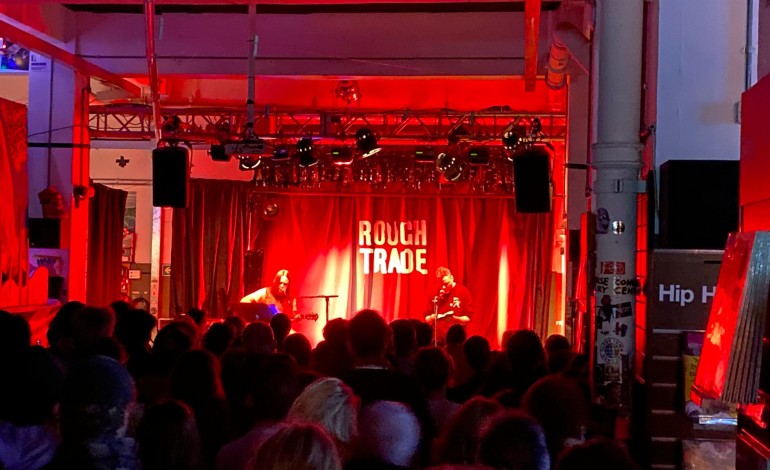
In the dimly lit space of Rough Trade East, on a December evening just days before Christmas, Max Porter and Anna B Savage delivered a performance that felt as though it were crafted for the complex emotional terrain of the season. Part intimate confessional, part sonic exploration, the event was less a concert and more a shared experience—a wrestling match with memory, identity, and the raw threads of human connection.
The combination of Anna B Savage, a London-born singer-songwriter renowned for her introspective and emotionally resonant music, alongside acclaimed poetic prose writer Max Porter, is both unexpected and yet, simultaneously, the most natural duet in the world.
The main event of the night drew open as Savage finished playing a haunting rendition of Elliott Smith’s ‘Between the Bars’ and slipped into the acoustic strum that would become the emotional scaffolding of the evening. Her voice—at once velvet and mournfully elegiac—was the band, the rhythm section, and the atmosphere. With the mastery of a seasoned architect, she wielded a loop pedal to build and layer textures, creating an immersive sonic landscape.
Soaring and cracking above Savage’s soundtrack trod the arresting honesty of Porter’s poetry. He began a live reading of his latest work: ‘All of this Unreal Time.’ A writer known for his lyrical prowess, Porter brought raw candour and piercing insight to the stage.
His spoken words intertwined with Savage’s music, their voices bleeding into one another with a beautiful synchronicity. Her looping and layering became a counterpoint to his prose—a dialogue that felt both well rehearsed and yet never manufactured. At one point, Porter’s voice cracked with an apology: “I AM SO VERY SORRY.” The vulnerability was palpable, yet never mawkish. The performance was both an exploration and an exorcism of personal history.
One of the standout moments came around at the final moments of the night when Savage’s performance of “Lighthouse Keepers” brought the room to a hushed reverence. The song felt universal in its sentiment. “I know that he is home,” she sang. “I know he’ll guide me home. He’s my lighthouse, he is home.” Her delivery was mournful yet tinged with hope, a counterpoint to Porter’s often raw and traumatic prose. Together, their interplay balanced the evening’s emotional weight, offering moments of light amidst the shadows.
The sentiment was a benediction. It was an appropriate ending for a night steeped in the complex feelings Christmas evokes: the nostalgia for childhood, the yearning for home, the trauma that can linger in the season’s corners. Porter and Savage’s collaboration was, at its core, a reflection of those complexities—a mirror held up to the audience’s own tangled emotions.
The working relationship between the two was evidently profound. They weren’t just two friends on stage; they were co-conspirators in an artistic endeavour that blurred the lines between performance and catharsis. It was an evening that lingered, not just as a memory, but as a feeling.
